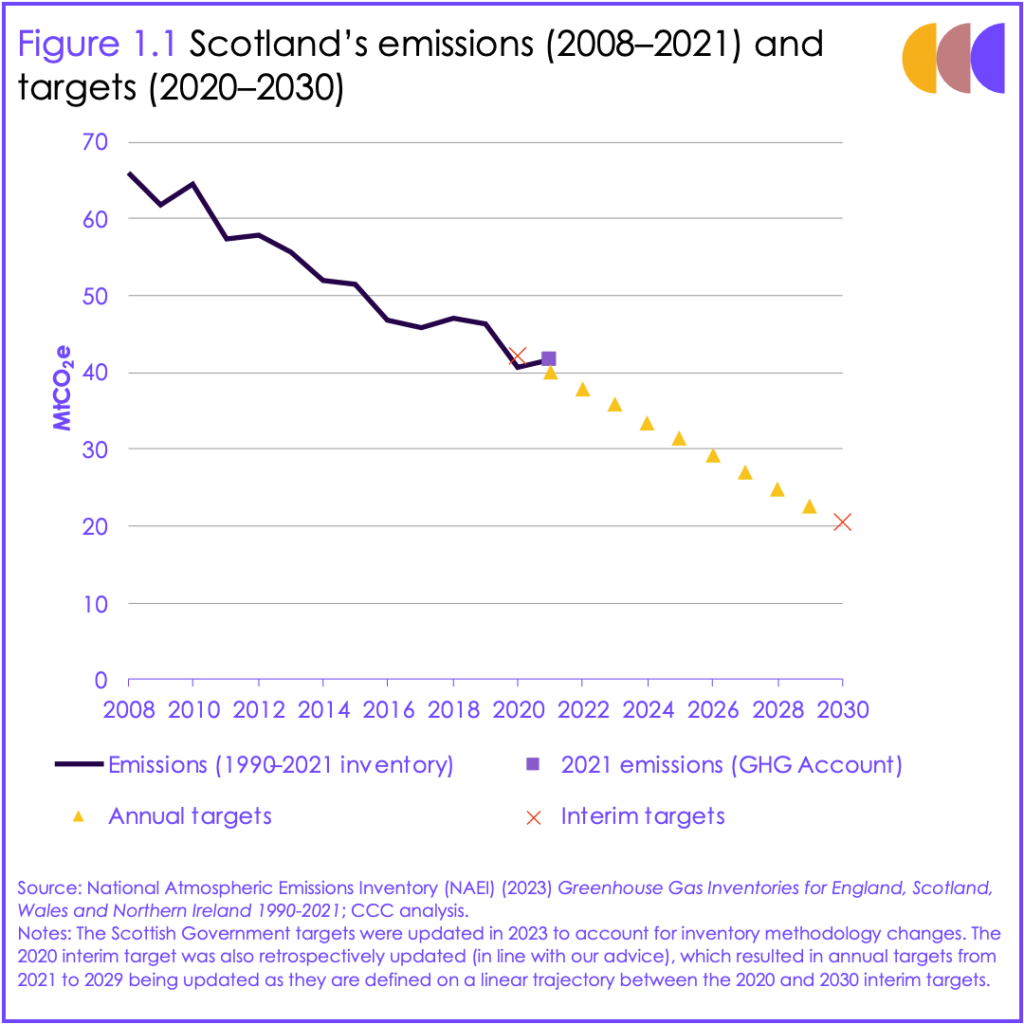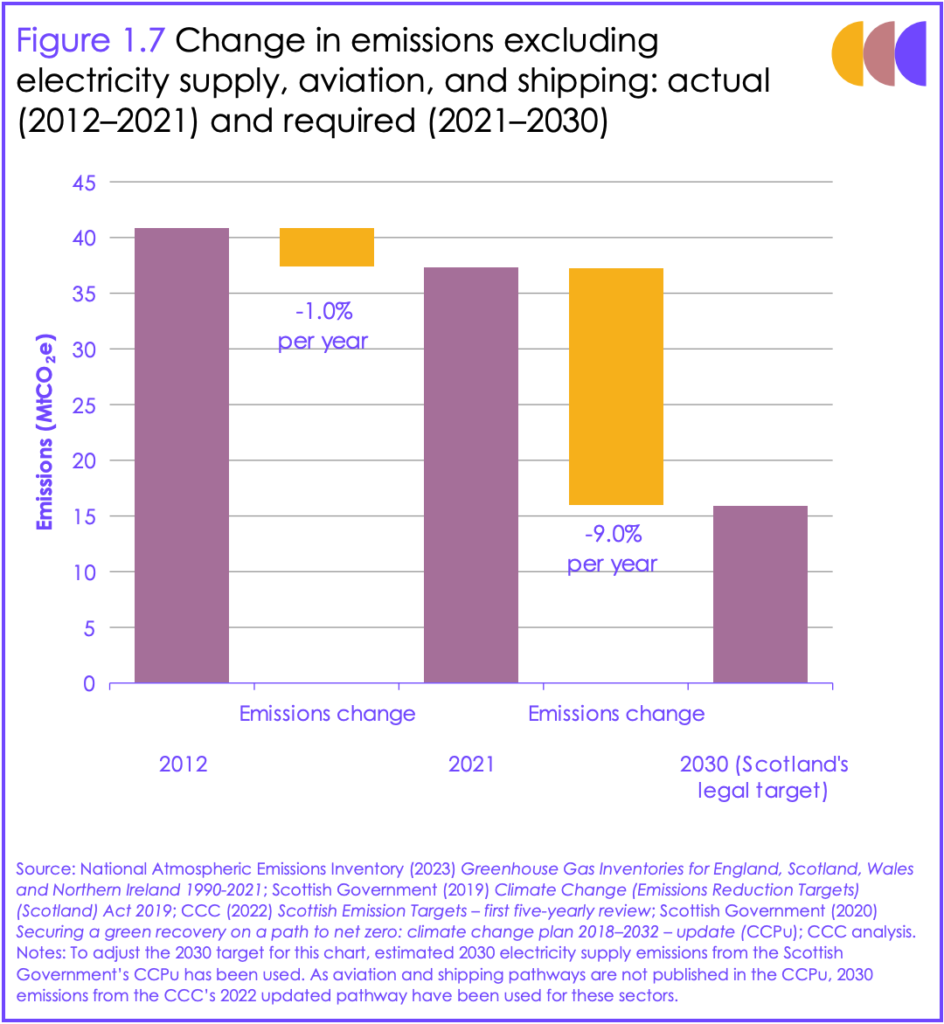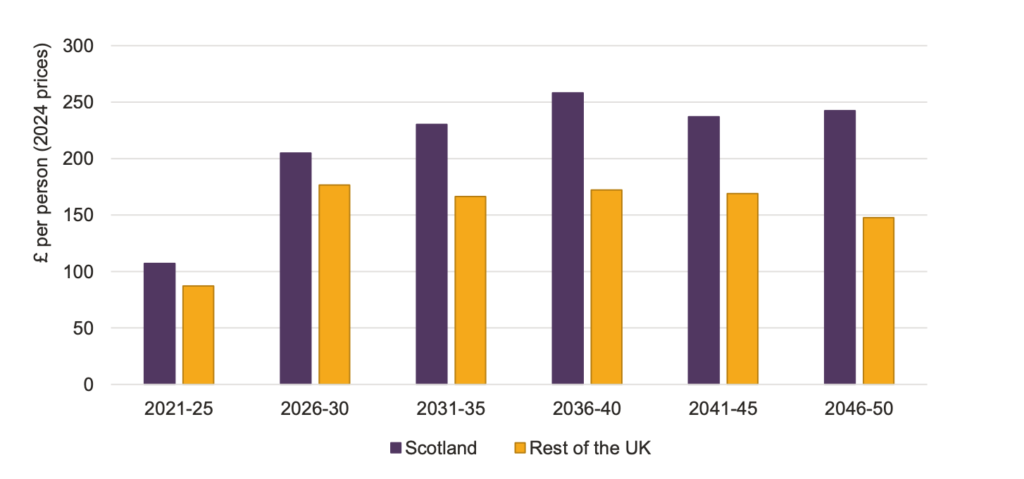The Investment Needed to Meet Scotland’s Climate Targets Could Threaten its Fiscal Sustainability – Without Greater Coordination with the UK Government

Rob Richardson
Two major recent reports have laid bare the scale of the challenges facing Scotland on the route to net zero. First, the Scottish Fiscal Commission reported that meeting statutory emissions targets, adapting to climate change, and responding to the damage it may cause all pose significant challenges to the Scottish Government’s fiscal sustainability. Then, the UK Climate Change Committee reported that Scotland’s statutory target of cutting emissions by 75% on 1990 levels by 2030 is out of reach, and would require an acceleration of progress beyond what is credible.
As IPPO’s work on fiscal constraint is exploring, pressures on public spending are already extreme, at UK, devolved and local government levels. Yet, if serious progress towards emissions reduction is to be made in Scotland, significant additional investment is needed now (Figure 1 and 2). As the Scottish Fiscal Commission (SFC) points out however, the Scottish Government’s Block Grant from the UK Government may not keep pace with the additional public investment required.


Mitigation may require disproportionate investment in devolved policy areas
Adapting to climate change and responding to damage caused by it will create costs. While there is great uncertainty around estimating the complex impacts, the Climate Change Committee estimates that approximately £10bn of investment is needed annually between 2020 and 2030 to secure UK-wide ‘climate resilience’.
Mitigation will require significant additional investment too. The Office for Budget Responsibility estimates that the cost of reaching net zero by 2050 across the UK will account for approximately 0.8% of GDP, or £20bn a year. Loss of fuel duty is estimated to be the largest single cost, with the cost of decarbonising buildings accounting for about half the total investment required.
According to SFC projections, there are some areas where mitigation costs may fall disproportionately across the UK within devolved policy areas (figure 3). The average additional capital investment required in devolved policy areas in Scotland is estimated as £1,136 million per year between 2020 and 2050, compared to the £9,582 million needed for the rest of the UK. This equates to £207 per person per year by the Scottish Government, and £149 per person per year in the rest of the UK.
The largest sector driving this differential is land use, land use change, and forestry (LULUFC), which includes crops grown to be burnt for energy, restoration of peatlands, and forestry. With over 30% of the UK landmass, and much of the UK’s peatlands, Scotland has a much higher proportion of these resources than its share of the UK population. As a result, the SFC estimates that the Scottish Government would need to invest five times as much per person per year than is needed for the UK as a whole if Scotland’s LULUFC is to meet the investment needed to help both Scotland and the UK achieve Net Zero. In comparison, while decarbonising buildings and surface transport will be costly overall, expected public spend will be broadly similar per person across the UK.

Climate goals and fiscal sustainability are intertwined across scales of governance
As much of the public investment required will fall within devolved policy areas, the Scottish Government’s Block Grant may not keep pace with increased investment in certain areas. This will create significant fiscal pressure on the Scottish Government. Investing £1,136 million a year would equate to 18% of the Scottish Government’s capital budget being spent on mitigation to reach net zero – at a time when the budget itself is falling in real terms.
The Scottish Government has limited policy levers available to meet this differential need. The powers it has to increase borrowing or taxation are unlikely to suffice. Neither is the option of potentially reallocating funds from resource spending, which would likely be to the detriment of other spending priorities such as social security commitments.
This all means that the net zero goals of the UK and Scottish Governments are heavily intertwined, which requires coordinated policy and fiscal approaches. As targets are set on a territorial basis, Scotland’s more ambitious 2030 target would require the Scottish Government to spend to make up for emissions in reserved policy areas, but it can only make reductions itself in devolved areas. Likewise, while the Scottish Government’s Block Grant changes in line with UK Government spending plans in devolved areas, this is not the case with reserved areas.
A joint report by the public audit offices of the four UK nations in September 2023 argued that the UK and devolved governments must act collectively if the UK as a whole is to reach net zero by 2050, given the different emissions profiles and varied approaches being taken. In reality, the responsibility for many policy areas is also split – operation of railway travel is devolved but railway infrastructure in managed UK-wide, for example.
Both the Climate Change Committee and the Scottish Fiscal Commission also call for greater coordination at different scales of governance, and more transparent plans for how net zero will be achieved. This call was made in particular reference to the Scottish Government’s upcoming Climate Change Plan, which provides an opportunity to set out how many of these issues will be addressed.
Evidence suggests that the scale of investment now required, at ever-increasing pace, will require substantial changes to how governments across the UK approach delivering net zero. The many ‘unknowns’, particularly over the scale of adaptation that will be required, render this even more crucial. It is clear, however, that the distribution of financial costs must be a key consideration if both fiscal sustainability and net zero targets are to be achieved in Scotland.
